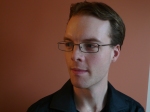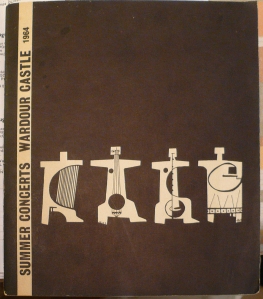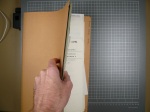1964:
- Messiaen 1 ACGB/51/1265
- Anthony Gilbert: solo piano Sonata, performed by Margaret Kitchin. 1
- Peter Maxwell Davies: Five Little Pieces for Piano, perf. Peter Maxwell Davies 1
‘There will be concerts by the Melos Ensemble, which will include along with classical works, the “Quatuor pour la Fin du Temps,” by Oliver [sic] Messiaen.’ ACGB/51/1265
1965
Visiting Artists:
- Bethany Beardslee: Milton Babbitt’s Philomel for soprano, recorded soprano and electronics. 1, Pierrot Lunaire with the Melos Ensemble cond. Edward Downes. 2, (Seabrook, Mike (1994), Max: The Life and Music of Peter Maxwell Davies (London: Victor Gollancz), 94.), ACGB/51/1265
- Leonard Stein: Arnold Schoenberg Op.23, Goehr’s Op.18. 1
- Melos Ensemble: Goehr Little Music for Strings, Bach’s Double Concerto cond. Lawrence Foster. 1, ACGB/51/1265
- Vocal Quartet: Barbara Elsy, Pauline Stevens, Ian Partridge, Geoffrey Shaw. They performed: Robin Holloway’s score for soprano (Elsy), baritone (Shaw) ensemble (Melos) cond. Goehr. 1
Composers:
- John Buller 1
- Harrison Birtwistle: Tragoedia (premiere) commissioned by the Melos Ensemble 1, dir./cond. Lawrence Foster, ‘To Michael Tippett on the occasion of his 60th birthday’ 20 August 1965: 2, 3, 4, 5, 6 (Hall, Michael (1984), Harrison Birtwistle (London: Robson Books), 32), (Seabrook, Mike (1994), Max: The Life and Music of Peter Maxwell Davies (London: Victor Gollancz), 93.), (Times, Monday August 23 1965, 15.)
‘Those who heard Tragoedia when it was first performed at the 1965 Wardour Castle Summer School have said they will never forget the excitement it generated. With it his career was assured. (Hall, Michael (1984), Harrison Birtwistle (London: Robson Books), 32)
‘the first performance of […] Tragoedia […] caused a tremendous stir of excitement’ (Seabrook, Mike (1994), Max: The Life and Music of Peter Maxwell Davies (London: Victor Gollancz), 93.)
‘Actually, it was a knockout – as that evening’s rave reception of the first performance duly confirmed. And it marked the definitive arrival of Harrison Birtwistle.’ 1
- Peter Maxwell Davies: Ecce Manus Tradentis 1, 2, (Seabrook, Mike (1994), Max: The Life and Music of Peter Maxwell Davies (London: Victor Gollancz), 93.), (Times, Monday August 23 1965, 15.)
‘The short instrumental first part, Eram Quasi Agnus, was commissioned by the English Bach Festival and was not composed until later – it received its first performance in 1969. But the bigger vocal and choral second half was performed on this occasion at Wardour Castle by the Summer School Choir with the Melos Ensemble, and soloists Bethany Beardslee, Pauline Stevens, Ian Partridge and Geoffrey Shaw.’ (Seabrook, Mike (1994), Max: The Life and Music of Peter Maxwell Davies (London: Victor Gollancz), 93.)
- David Bedford: Dream of the Seven Lost Stars ‘summer school choir under John Alldis’ 1 performed on the last night (21st?) with ‘music by Messiaen and a Bach cantata’. 2, ACGB/51/1265
- Schoenberg, Arnold: Pierrot Lunaire (Seabrook, Mike (1994), Max: The Life and Music of Peter Maxwell Davies (London: Victor Gollancz), 94.), (Burden, Michael (2000), ‘A foxtrot to the crucifiction’, Perspectives on Peter Maxwell Davies (Aldershot, Ashgate), 52.), ACGB/51/1265
- Tallis, Thomas: Spem in alium, cond. Michael Tippett. ACGB/51/1265
- Wood, Hugh: A work for choir and orchestra? ACGB/51/1265
‘Concerts, open to the public, but free to all students, will be given during the course by the Melos Ensemble and other artists. These will include the first performances of works by Birtwistle, Goehr and Maxwell Davies commissioned for the occasion by the Melos Ensemble. The concerts will also include The Musical Offering by J. S. Bach and a performance with Bethany Beardslee, of “Pierrot Lumaire” by Schoeberg. The Summer School is also commissioning other works for these concerts by composers who will be present at the course.’ ACGB/51/1265
Filed under: What music was performed?, Babbitt, Bach, Beardslee, Bedford, Birtwistle, Davies, Edward Downes, Five Little Pieces for Piano, Geoffrey Shaw, Gilbert, Goehr, Ian Partridge, Kitchin, Lawrence Foster, Melos Ensemble, Pauline Stevens, Pierrot Lunaire, Schoenberg, Stein, Tallis, Tippett, Tradoedia, Wood



31/08/2010 • 1:17 pm 0
Roger Smalley
I met with Roger Smalley in Glebe, Sydney, 7 April, 2010. I interviewed him partly for his recollections as a participant at the WCSS and partly to find out more about his performance there in 1965. As a member of the Composers’ Ensemble he performed in one of the last concerts on the 1965 programme, which was a substantially different to the other concerts. It consisted of Cage, Feldman, Cardew, Messiaen, Stockhausen and one of Smalley’s compositions, Two Poems of D. H. Lawrence.
Read the rest of this entry »
Filed under: Commentary from Interviews, Cage, Cardew, Composers' Ensemble, Feldman, flights, Gilbert, kangaroo hunt, Kelly Ground, Lumsdaine, Messiaen, pulses, Smalley, Stockhausen, Tippett